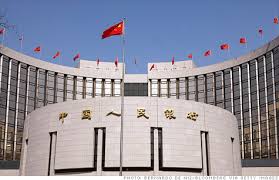
China To Join Venezuela As Another Country With Its Own Crypto

In a strategy to protect the value its own currency against cryptocurrencies such as Bitcoin (BTC), Ethereum (ETH) and Ripple (XRP), the Chinese Central bank has indicated plans of developing its own government regulated digital currency. The announcement was made on the website belonging to the Central bank of the People’s Republic of China.
In it, it says on 28th of March this year, the People’s Bank of China convened the 2018 National Currency Gold and Silver Work Video and Telephone Conference. The meeting discussed the achievements made in monetary gold and silver work in the country over the past few years. The Deputy Governor of the Chinese Central Bank, Fan Yifei, and member of the Communist Party Of China, delivered a speech.
In it, he said that the People’s Bank Party Commitee and the People’s Bank monetary gold and silver department was geared towards problem-oriented, market-oriented and livelihood-oriented practices and has continually changed its working philosophy, style and methods, to continue to promote and reform key areas of the country’s currency and reserves.
He pointed out that the traditional business environment is constantly changing through the development of a digital economy, diversified payment instruments and changes in the use of regular fiat. This will in turn impact the circulation of the Country’s Yuan (RMB). He added that The People’s Bank of China needs to be innovative with the current market tides while still retaining the sole role of monitoring the country’s economy, cash in circulation and in reserves and protecting the interests of its citizens.
It is with these statement that China is planning to develop its own state controlled cryptocurrency.
Perhaps a good preview of how the Chinese digital currency will operate, can be found in the basic underlying principles of a coin yet to be made public. This coin is known as Basecoin and its concept is to be a stable cryptocurrency that retains its value despite the constant market up and downs that are prominent in the Crypto-verse due to a volatile Bitcoin.
Assume that you bought Bitcoin during its $20,000 peak last year in December. Back then, that 1 BTC would buy a good SUV at that value. Now assume you are the car dealer accepting the payment in BTC. You love Bitcoin, so you stashed it away in your wallet but now that 1 BTC is worth less than a third of what it was worth in December: $7,200. This event is known as inflation. When the purchasing power of a currency drops.
Basecoin uses an algorithm to maintain the value of the coin by pegging it to a stable currency such as the USD in a manner similar to how USDT (Tether) does. Down the line, Basecoin will be pegged to a Consumer Price Index (CPI) or basket of goods similar to how central banks hit inflation targets today. This will avoid situation such as the hyperinflation in Zimbabwe that has the led the country’s Central Bank to recognize nine other currencies as legal tender: the U.S. Dollar, Australian Dollar, South African Rand, Botswana Pula, The Euro, British Pound, Japanese Yen, Chinese Yuan and Indian Rupee.
The Venezuelan Petro crytpocurrency is pegged to the price of a barrel of oil and then backed by the country’s oil reserves. It will be issued by the Venezuelan State as a spearhead for the development of an independent, transparent and open digital economy open to direct participation of citizens. It will also serve as a platform for the growth of a fairer financial system that contributes to development, autonomy and trade between emerging economies.
The Chinese Central Bank has not yet been made public what its digital currency will be pegged on. But by using the above cryptocurrencies as examples, it will probably be backed by the country’s own fiat currency and reserves.
[Photo source, money.cnn.com]